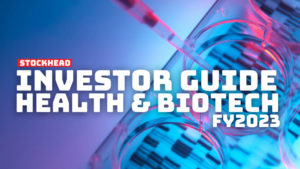If the biotech sector were a classroom, the teacher’s end-of-year report card would read something like: “a patchy but solid effort in trying conditions, with the star students hampered by some notable laggards at the back of the class”.
Here are your columnist’s top performers for the year – the Magnificent Seven – and the six worst disappointments, a.k.a. The Dirty (Half) Dozen.
Our criteria, naturally, are weighted to the share price but in some cases the market’s adjudication does not reflect the level of achievement or – indeed – disachievement.
THE MAGNIFICENT SEVEN
It’s impossible to kick off the narrative with any stock other than Neuren Pharmaceuticals, given its heroic achievement in securing US Food and Drug Administration approval for its Rett syndrome drug trofinetide.
Strictly speaking, Neuren’s partner Acadia shepherded the rebadged Daybue through the process, but it was Neuren that spent 10 years developing the drug at a cost of more than $300 million.
Rett syndrome affects girls and is marked by problems including difficulties in talking, breathing, eating and sleeping.
Neuren chief Jon Pilcher said he had a bad feeling when he had not heard from Acadia on FDA deadline day and went for a dip in a wild ocean beach to clear his head.
The starfish and octopi had some good news.
The approval paves the way for Neuren to receive hundreds of millions of dollars of sales milestones and royalties, as well as a share of a valuable Rare Paediatric Disease Priority Review Voucher.
Neuren shares leaped 18 per cent on the day but have since more than doubled on strong early sales.
If Neuren is the dux of the class, then Pro Medicus is the worthy recipient of the principal’s special achievement award after this year’s circa 50 per cent share surge.
The US-focused imaging house had a stellar year, winning a slew of private sector hospitals in the US, as well as consolidating its position among the ‘sandstone’ academic institutions.
The new wins should silence the doubters who claimed Pro Medicus had run out of US growth options.
The Pro Medicus story has been one of cross-country endurance rather than a sprint, but with a $9 billion market cap the company can’t afford to take any short cuts across the back oval when it thinks no one is looking.
In June, Dimerix chief Dr Nina Webster said the kidney drug developer had fielded “material offers” and signed non-binding term sheets on “commercially attractive opportunities”.
But doesn’t every biotech chief make such claims?
Lo and behold, three months later Dimerix followed through with an exclusive licensing deal for its lead compound DMX200, to treat the rare kidney disease focal segmental glomerulo-sclerosis (FSGS).
With a headline worth of “up to” $230 million, the deal is with the London-based Advanz Pharma Corp and pertains to Europe, the UK, Switzerland as well as here and in New Zealand. The notable exception is the US market and punters are waiting for a follow-up deal pertaining to this crucial geography.
While the Advanz deal included a $10.8 million upfront payment the rest is back-ended, which means the drug must be approved for the full riches to flow.
The company currently is carrying out a Phase III trial dubbed Action3, with results slated for March 2024.
Dimerix shares popped more than three-fold after the Advanz Pharma news, but investors need to remain patient.
Speaking of such, three decades is a long time to remain cross-legged and quietly listening to ‘teacher’ – a.k.a. the FDA.
But Cyclopharm’s diligence paid off in spades, with the Administration in early October approving the company’s Technegas lung imaging device. The tool already had been approved in 64 other countries, including neighbouring Canada, for yonks.
A further rejection would have been quite a shock given the FDA was emitting more warm signals than a bucket of plutonium.
Speaking of nuclear material, Technegas consists of teeny-tiny, dry-carbon nano-particles irradiated with the isotope Technetium-99. The gas-like substance is freshly brewed by heating a carbon crucible to 2,700 degrees Celsius and inhaled by the patient via tubing.
The company estimates the US pulmonary embolism diagnosis opportunity at $US180 million a year.
While prone to occasional lapses in concentration – share price-wise – Telix Pharmaceuticals has completed a pleasing year on the back of its FDA-approved Illucix, a nuclear imaging tool for prostate cancer patients suspected of having either metastasized growths or a recurrence based on elevated prostate specific antigen (PSA) levels.
Telix’s busy homework slate includes furthering FDA applications for renal (kidney) cancer and brain cancer diagnostics, as well as securing European and UK consent.
Telix shares spurted more than 30 per cent this year and the stock is valued at more than $3 billion.
If there’s one more satisfying achievement in teaching than helping a diligent student to succeed, it’s nurturing a delinquent one to success.
Take Lumos Diagnostics, which is developing rapid point-of-care tests to help healthcare professionals diagnose and manage medical conditions more accurately.
That’s great, but it’s all in the timing and Lumos flopped after its July 2021, pandemic era debut that raised a chunky $63 million.
At one stage, the stock had lost 99 per cent of its value. When we probed the company in June, it bore a sickly $3.6 million market cap.
The key problem was last year’s FDA decision to decline marketing approval for the company’s viral-versus-bacterial test, Febridx. But in early July, the Administration unexpectedly had a change of heart and approved the tool.
The US sees more than 210 million outpatient antibiotics prescriptions a year, but 40 per cent are unnecessary because the condition is not bacterial.
Lumos shares leaped an extraordinary 1,600 per cent – from one cent to 16 cents – and will end the year with a circa 600 per cent gain.
Meanwhile, the revolving door of CEOs has been whizzing around at chunderous speeds.
In the case of device manufacturer Impedimed, newly-installed CEO Rick Valencia outlined his change agenda to your columnist in early May, based on a sharper focus on commercialisation.
As it happened, other parties had change agendas of their own, based on – you guessed it – a sharper focus on commercialisation.
Shortly after a successful board coup in early October, Valencia resigned to be replaced by former Neuren co-CEO Dr Parmjot Bains.
Impedimed had been having a good year, with the US rollout of its Sozo lymphoedema detection devices gaining traction. The device is winning reimbursement and has been deemed the standard-of-care for monitoring all cancer patients susceptible to lymphoedema.
Impedimed shares lost steam after the board challenge emerged in April, but the stock still looks like ending the year two-thirds higher.
THE DIRTY HALF-DOZEN
As an aspirational column in an optimistic publication, Dr Boreham is loath to dwell too much on the sector’s glaring mis-hits of the year. Having said that, we can’t ignore the delinquents skulking at the back of the class or behind the shelter shed (being medical professionals hopefully they are not smoking, or even vaping).
Mesoblast arguably was the most notable failure, with the FDA again declining to grant approval for its stem cell treatment for graft-versus-host disease.
A single transgression is excusable, but the FDA had previously knocked back the treatment, while the company had earlier trial setbacks with its heart disease program.
When will this pattern of unacceptable behaviour be broken? Or is the FDA just a playground bully, making up the rules as it goes along?
Mesoblast last week unveiled a placement to raise $36 million and a rights issue to raise a further $61 million – so even the most difficult students can raise a heck of a lot of lunch money.
Mesoblast shares have lost two-thirds of their value this year, as have shares in the Car-T immunotherapy play Chimeric Therapeutics.
It’s a rare miss for backer Paul Hopper, a past prefect responsible for many sector successes.
Chimeric’s vaunted glioblastoma treatment derives from the venom (peptide) of the deathstalker scorpion but this one has lost it sting.
Meanwhile, some new arrivals to the classroom have struggled to fit in.
Cleo Diagnostics listed with much fanfare in August, after raising $12 million, to further its imaging tech for hard-to-diagnose ovarian cancer. The shares are 20 per cent in the red.
The story, it seemed, wasn’t strong enough for generally wary investors and it’s off to remedial class for Cleo.
Two days later Curvebeam AI listed, with its weight-based computed tomography (WBCT) device, to monitor orthopaedics and bone health conditions.
Curvebeam claimed the advocacy of US President Joe Biden, who underwent WBCT to monitor healing progression of a hairline fracture in his foot, sustained while playing with his dogs.
But not even the POTUS pooches and the on-trend AI theme could prevent Curvebeam shares from losing up to 45 per cent of their value at one stage. It’s currently down 33.3 per cent.
The equivalent of Dettol for playground scrapes, wound treatment house Next Science has an array of approved non-toxic products to ward off infections.
The class has been disrupted by long-standing CEO Judith Mitchell retiring mid-year and being replaced by American exchange student Harry Thomas Hall IV.
Next Science shares lost 70 per cent of their value this year.
The company is not a delinquent student, but extra after-hours tuition is required.
Finally, the normally diligent students CSL and Resmed have never been sent to the headmaster for the cuts, so their recent abhorrent share price behaviour suggests they have been hanging out with the wrong crowd.
The culprit is Ozempic, the diabetes drug turned miracle weight loss treatment that could reduce demand for the duo’s products.
Why? Obese people snore more, so if they are thinner, they won’t need Resmed’s sleep apnoea masks.
Hmmmm – should that be enough for Resmed shares to shed 23 per cent?
With CSL, it is feared an outbreak of non-obesity will affect its acquired Vifor, a leading provider of kidney dialysis. But most of CSL’s income is derived from blood products to treat conditions such as haemophilia.
The jury is out on the long-term efficacy of Ozempic (or similar drugs). Ultimately, patient waistlines are likely to bulk up again, along with CSL’s and Resmed’s share price.
Speaking of which, Dr Boreham is signing off to negate his recent weight loss efforts with lashings of Heart Foundation unapproved post-Christmas fare.
No matter your belief – Christian, Jewish, Moslem, Pagan or Pastafarian – all the best for the festive season.
Disclosure: Dr Boreham is not a qualified medical practitioner and does not possess a doctorate of any sort. But he always tries hard, listens to the teacher and avoids the school bullies.
This column first appeared in Biotech Daily
The views, information, or opinions expressed in the interviews in this article are solely those of the interviewees and do not represent the views of Stockhead. Stockhead does not provide, endorse or otherwise assume responsibility for any financial product advice contained in this article.
You might be interested in












